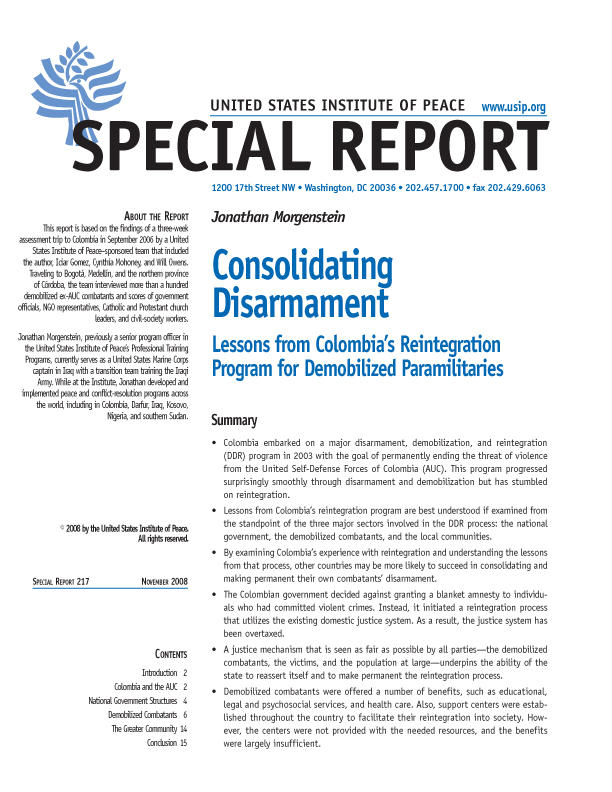An essential component of any post-conflict stabilization program is the permanent dismantlement of armed groups and their fruitful absorption into civilian society—this process is known as disarmament, demobilization, and reintegration. Although Colombia continues to wrestle with violent conflict at the hands of multiple armed factions, the country embarked on a major DDR program in 2003 with the goal of permanently ending the threat of violence from one of those armed factions—the United Self-Defense Forces of Colombia (Autodefensas Unidas de Colombia, or AUC).

Summary
- Colombia embarked on a major disarmament, demobilization, and reintegration (DDR) program in 2003 with the goal of permanently ending the threat of violence from the United Self-Defense Forces of Colombia (AUC). This program progressed surprisingly smoothly through disarmament and demobilization but has stumbled on reintegration.
- Lessons from Colombia’s reintegration program are best understood if examined from the standpoint of the three major sectors involved in the DDR process: the national government, the demobilized combatants, and the local communities.
- By examining Colombia’s experience with reintegration and understanding the lessons from that process, other countries may be more likely to succeed in consolidating and making permanent their own combatants’ disarmament.
- The Colombian government decided against granting a blanket amnesty to individuals who had committed violent crimes. Instead, it initiated a reintegration process that utilizes the existing domestic justice system. As a result, the justice system has been overtaxed.
- A justice mechanism that is seen as fair as possible by all parties—the demobilized combatants, the victims, and the population at large—underpins the ability of the state to reassert itself and to make permanent the reintegration process.
- Demobilized combatants were offered a number of benefits, such as educational, legal and psychosocial services, and health care. Also, support centers were established throughout the country to facilitate their reintegration into society. However, the centers were not provided with the needed resources, and the benefits were largely insufficient.
- Support centers should be a lynchpin to any government’s reintegration efforts. These centers should be fully staffed with personnel who have gone through significant training on all the regulations governing the DDR process and all the resources available to the demobilized combatants.
- Governments must provide access to appropriate educational and training programs to ensure successful reintegration. Further, offering appropriate incentives for attendance would substantially increase the likelihood of successfully reintegrating ex-combatants.
- The national government failed to communicate the details of the reintegration program to local authorities. As a result, civilian populations were often left uninformed, exacerbating feelings of alienation and the perception that their government was collaborating against them and their interests.
- Reintegration programs must be flexible and adapt to local needs and concerns. Further, a comprehensive strategic communications plan is important to ensure transparency and the appropriate dissemination of information and to minimize local frictions over reintegration efforts.
- If the problems with Colombia’s current reintegration program are not addressed, many of the demobilized combatants may return to their former lives of violence and crime, and Colombia will miss out on the real peace that has eluded it for almost sixty years.
About the Report
This report is based on the findings of a three-week assessment trip to Colombia in September 2006 by a United States Institute of Peace–sponsored team that included the author, Iciar Gomez, Cynthia Mohoney, and Will Owens. Traveling to Bogotá, Medellín, and the northern province of Córdoba, the team interviewed more than a hundred demobilized ex-AUC combatants and scores of government officials, NGO representatives, Catholic and Protestant church leaders, and civil-society workers.
Jonathan Morgenstein, previously a senior program officer in the United States Institute of Peace’s Professional Training Programs, currently serves as a United States Marine Corps captain in Iraq with a transition team training the Iraqi Army. While at the Institute, Jonathan developed and implemented peace and conflict-resolution programs across the world, including in Colombia, Darfur, Iraq, Kosovo, Nigeria, and southern Sudan.